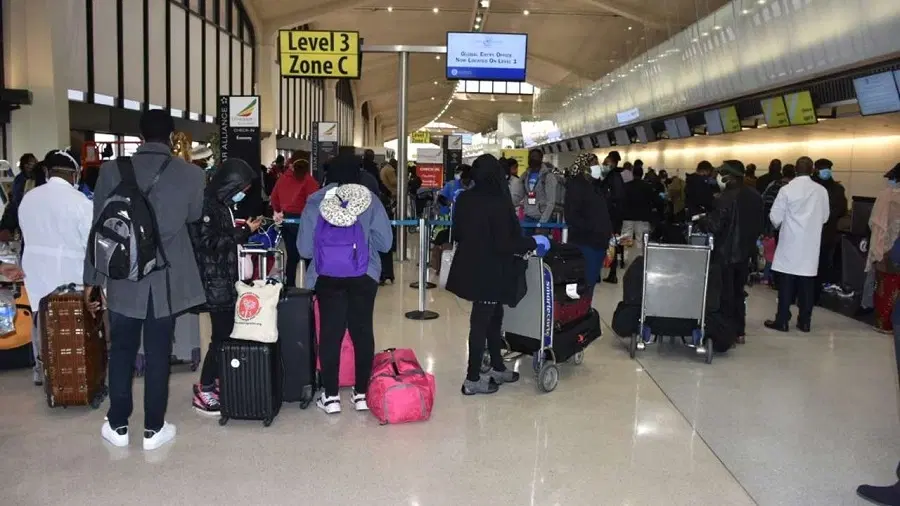INTERNATIONAL

NIGERIANS FACE POSSIBLE DEPORTATION AS UK DROPS OVER 100 JOBS FROM SKILLED WORKER VISA SCHEME
Thousands of Nigerians working in the United Kingdom under the Certificate of Sponsorship (CoS) or Skilled Worker visas are facing uncertainty due to recent immigration reforms introduced by the UK government.
As part of its ongoing efforts to curb net migration, the UK has eliminated over 100 job roles from the CoS eligibility list and significantly raised the salary thresholds required for visa sponsorship. Many positions once considered skilled have now been removed, while others are now subject to higher educational and income requirements.
Under the new policy, which came into effect on July 22, 2025, roles previously classified at RQF Level 3–5—such as certain administrative, care, and technical support jobs—are no longer eligible unless included on a newly established Temporary Shortage Occupation List. The minimum acceptable skill level for most sponsored roles has been increased to RQF Level 6 (Bachelor’s degree equivalent).
Removed roles include managerial positions in agriculture, hospitality, and logistics; health and community support occupations like dispensing opticians, youth workers, and counsellors; protective service jobs including police officers, firefighters, and prison officers; and creative roles such as authors, actors, dancers, and designers.
The changes also raised the general Skilled Worker salary threshold to £41,700 annually, while health and care roles must meet a lower threshold of £25,600. However, employers must now demonstrate that this amount is what the employee receives after deductions for accommodation, transport, and other costs.
This shift has thrown many foreign workers—including a significant number of Nigerians—into panic. Previously eligible jobs, like entry-level IT support and customer service, no longer qualify unless employers can match the new salary standards. Many employers are reportedly struggling to meet these new obligations.
According to a UK-based travel consultant, Kayode Alabi, Nigerian workers whose roles have been delisted will likely be unable to renew their visas once their current sponsorship ends. Sponsorships typically last between one to five years, and those unable to secure a new sponsor will be at risk of becoming undocumented immigrants.
“No one has been terminated yet,” Alabi noted, “but the reality is that when current sponsorships expire, many will be stranded. Without a new job in an eligible category, renewing a visa becomes impossible. The salary increase also makes it harder for employers to continue sponsoring existing workers.”
He explained that even those whose jobs remain eligible might still face deportation if their employers cannot meet the increased salary thresholds. “Imagine someone currently earning £26,000—how will their company suddenly raise that to £41,700? It’s a major concern.”
Reports from the UK confirm that many Nigerians are already deeply anxious about their future. One Nigerian worker said his visa would soon expire, and his employer had already indicated they couldn’t afford the new salary requirement. “It’s very hard,” he said. “I don’t even know what to do.”
Another caregiver voiced similar concerns, saying her visa sponsorship ends in August, and she is unable to find a new role that meets the updated salary standards. “I may likely return home,” she said.
Other affected individuals, speaking anonymously, shared that the reforms have dashed their long-term plans in the UK. One worker, who arrived in early 2023 with a three-year CoS visa, said his role has now been delisted, and he may be forced to leave when his sponsorship ends in less than a year.
A consultant with expertise in international education and migration, Sulaimon Okewole, estimates that over 10,000 Nigerians could be forced to return home due to the new restrictions. He acknowledged the UK government’s intent to manage immigration but stressed that the impact on Nigerians—many of whom have built careers in sectors like healthcare and IT—is significant.
“The sharp rise in salary thresholds means fewer job offers, unless employers adjust pay scales, which isn’t easy in the current economic climate,” Okewole said. “This will limit options for those who previously saw the UK as a promising destination.”
He added that this shift might push more Nigerians to seek opportunities in other countries with more accommodating immigration systems.
Meanwhile, the effects are already being felt by families. A student from the University of Ibadan shared concerns about her mother, a caregiver in the UK. “Her sponsorship ends in November, and her job has been delisted. She’s very worried because finding a new sponsor now seems almost impossible.”
"This represents a significant development in our ongoing coverage of current events."— Editorial Board









